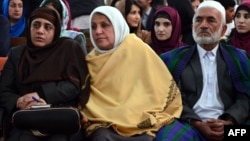Human rights organizations have voiced "grave concerns" over the rise in summary court convictions in Afghanistan after a video of one such trial was posted on social media last week.
In the video, which was filmed outside the capital, Kabul, a group of four men and a woman were convicted of adultery by men who called themselves "mujahidin," a title the Taliban always uses to identify its fighters.
The men in the video, who appeared to have been beaten up, confessed to having been involved in the act of adultery, an offense that carries severe punishments under both Afghan and Islamic Sharia law, if proved.
The Afghan Independent Human Rights Commission said summary court convictions are grave sources of concern, "especially when it happens in areas under the control of the Afghan government."
"Lashing, beheading, killing and stoning are among the verdicts of the summary court trials conducted in Afghanistan," Bilal Sidiqi, Afghan AIHRC spokesperson, told VOA.
During the past three months, AIHRC has recorded at least three cases of summary court convictions, while the number of such incidents reached eight last year.
Hinder justice
United Nation Assistance Mission in Afghanistan (UNAMA) condemned the conduct of such trials and criticized what it called "traditional dispute-resolution mechanisms."
Responding to a VOA query, UNAMA stated: "The handling of criminal cases outside Afghanistan’s court system can hinder justice and the realization of human rights. Afghanistan’s laws and penal code do not include any legal provision allowing for the mediation of criminal cases. Traditional dispute-resolution mechanisms should not be used in criminal cases to replace the existing legal framework or court adjudication processes of the government of Afghanistan."
Human rights organizations also criticized the Afghan government for failing to prosecute the perpetrators.
"We call on the Afghan government to take serious measures to prevent such inhumane incidents," Siddiqi said.
The Afghan government is striving to expand its control all over the country’s territories so everyone has access to the justice system, the Afghan presidential palace told VOA.
"The acts [summary trials] carried out by the Taliban and other terrorist groups against the people are criminal offenses," Afghan presidential spokesperson Shah Hussain Murtazawi told VOA.
Taliban insurgents in Afghanistan are being widely accused of conducting summary trials in the country.
"We have recorded a number of summary convictions in restive areas and frequently the areas under Taliban control. Efforts were made to investigate and prosecute those who conduct summary trials," Najib Danish, spokesperson for the Afghan interior minister, told VOA.
Against the law
Summary court convictions by the Taliban and other radical groups contradict the Afghan constitution and Islamic law, said Behrooz Jahanyar, a Kabul-based lawyer.
"What the Taliban is doing is absolutely against the Islamic law. Summary trials have no place in Afghan laws, either. No one can be convicted or punished without going through all court proceedings and access to appeal in a higher court," Jahanyar told VOA.
Members of civil society organizations in Afghanistan allege that the issue of summary trials is more severe than it appears to be.
"Summary trials are conducted more in remote and hard-to-reach areas, where fear of retaliation prevents people from reporting such incidents," Kabul-based civil activist Abdul Wodood Pedram, told VOA.
Although the authenticity of the videos posted on social media cannot be confirmed, disturbing footage is being posted periodically by militant groups in Afghanistan of women being stoned and beaten with batons, men being slashed, and Afghan soldiers captured by militants being shot to death.
